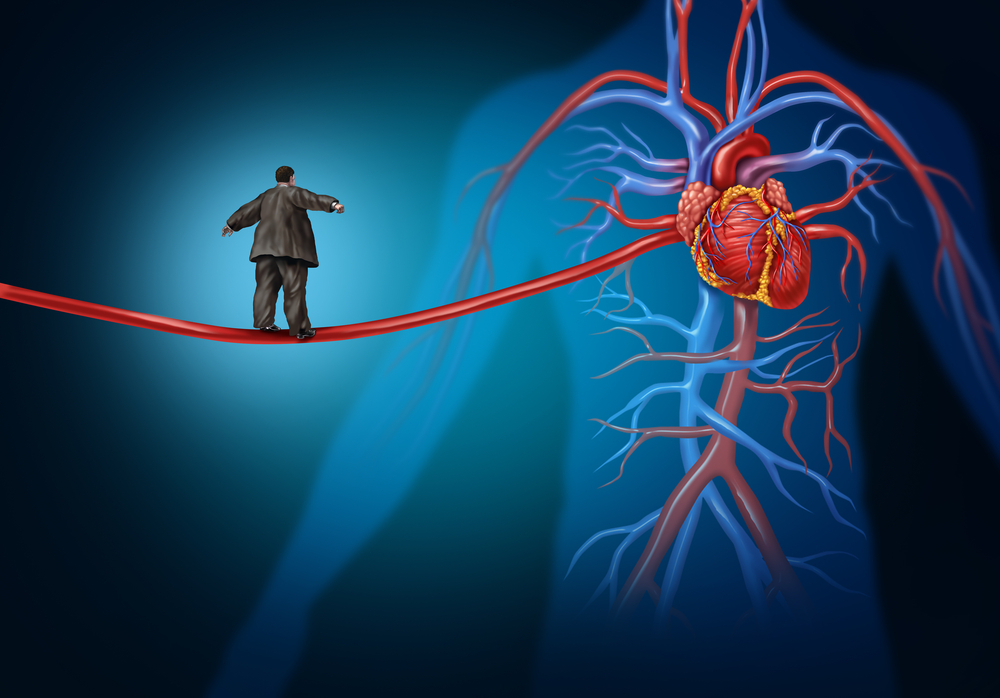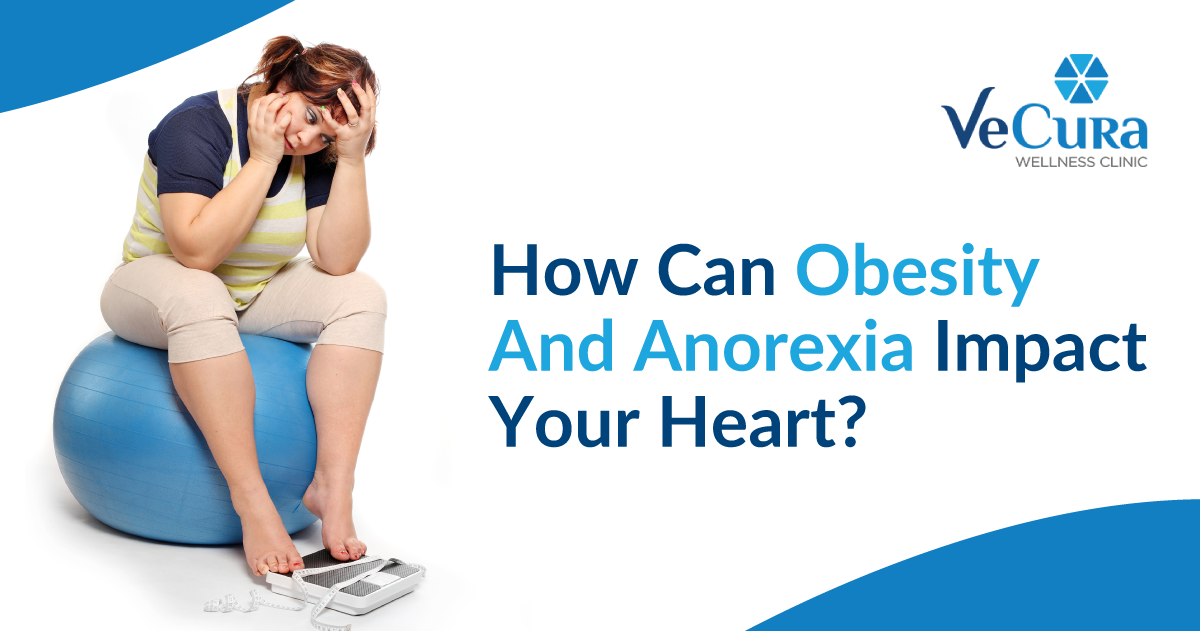Are you aware of how obesity and anorexia impact your heart health? In this blog, we delve into the effects of these prevalent eating disorders on your heart, from heart failure to high blood pressure. But don’t worry, we’ve got you covered with prevention and treatment strategies too! Keep scrolling to find out more!
Obesity and anorexia are two of the most prevalent eating disorders today. While they may seem like opposite ends of the spectrum, they share a common trait: both can have a significant impact on the heart.
As the body’s engine, the heart is responsible for pumping blood and oxygen to all parts of the body, and when it is affected by obesity or anorexia, it can lead to severe and sometimes life-threatening complications.
In this blog post, we’ll explore how obesity and anorexia impact your heart and strategies for managing and reducing the risks associated with them.
How Obesity Impact Your Heart
Obesity and the heart are strongly linked, as carrying excess weight can increase the risk of cardiovascular problems.
The heart is one of the most essential organs in the body, as it pumps blood throughout the circulatory system and ensures that vital organs and tissues receive the oxygen and nutrients they require to function properly.
When a person is obese, their heart is put under a lot of strain. This is because the heart has to work much harder to pump blood around the body, which causes numerous problems over time.
[et_pb_section global_module="1526 "][/et_pb_section]High blood pressure is one of the most common cardiovascular problems associated with obesity. Increased blood pressure can occur when the heart works harder to pump blood. This can damage the arteries over time, increasing the risk of heart disease and stroke.
Obesity is also associated with an increased risk of developing high cholesterol levels, which can contribute to artery plaque buildup. This can narrow the arteries and reduce blood flow to the heart, resulting in coronary artery disease.

Obesity, in addition to these cardiovascular issues, can also increase the risk of heart failure, a condition in which the heart can no longer effectively pump blood. Various factors can contribute to this, including heart muscle damage, high blood pressure, and coronary artery disease.
Obesity can also increase the risk of developing type 2 diabetes, which is a major risk factor for heart disease. When a person has diabetes, their body cannot properly regulate blood sugar levels, leading to many health problems, including damage to the blood vessels and nerves that control the heart.
Overall, the link between obesity and the heart is clear, and it is important for individuals who are overweight or obese to take steps to manage their weight and reduce their risk of cardiovascular problems.
This involves making changes to their diet, increasing physical activity levels, and seeking medical support as needed.
How Anorexia Impact Your Heart
Anorexia nervosa is a mental health disorder characterised by a distorted body image, an intense fear of gaining weight, and an obsession with weight loss.
People with anorexia often have an extremely low body weight, which can have serious health consequences, including an increased risk of heart problems.
We all know that the heart is a muscle that pumps blood throughout the body and requires a certain amount of energy to function properly. So naturally, this energy comes from the food we eat.
When someone severely restricts their food intake, as is common in anorexia, the body is not getting enough energy to support the heart and other vital organs.
One of the most common heart problems associated with anorexia is bradycardia or a slow heart rate. When the body does not receive enough energy, the heart has to work harder to pump blood, which can cause it to slow down. This can cause dizziness, fainting, and fatigue.
Hypotension (low blood pressure) is another common heart problem associated with anorexia. When the heart does not pump enough blood, blood pressure drops, causing similar symptoms of weakness.
Anorexia can also result in orthostatic hypotension or a sudden drop in blood pressure when standing up. This can result in dizziness, blurred vision, and fainting.
Anorexia can cause long-term damage to the heart in addition to its immediate effects. Anorexics are more likely to develop heart disease, including heart attacks and heart failure. This is because the body lacks the nutrients required to keep the heart healthy.
Furthermore, the lack of nutrition can lead to an electrolyte imbalance in the body, which can also affect the heart. Electrolytes are minerals that are necessary for proper heart function, and when they are imbalanced, it can lead to irregular heart rhythms and other problems.
People with anorexia need to seek treatment as soon as possible to prevent long-term damage to their health. Treatment may involve therapy, medication, and nutritional counselling to help restore a healthy relationship with food and improve overall health.
Incorporating Lifestyle Changes To Improve Heart Health
Heart disease is one of the leading causes of death worldwide, and several factors, including genetics, age, and lifestyle, can cause it. While we can’t do much about genetics and age, we can significantly change our lifestyle to improve our heart health. Incorporating lifestyle changes can be challenging, but taking proactive steps to improve heart health is essential.
Here are some lifestyle changes that can help improve heart health:
- Eating a heart-healthy diet: A heart-healthy diet is high in fruits, vegetables, whole grains, lean protein, and healthy fats. It is also important to limit saturated and trans fats, added sugars, and salt in your diet.

- Avoiding processed foods, fast food, and sugary beverages can help lower your risk of heart disease.
- Regular physical activity: Regular physical activity can help improve heart health by lowering blood pressure, cholesterol, and the risk of obesity. Aim for at least 150 minutes of moderate-intensity aerobic exercise or 75 minutes of vigorous exercise per week.
- Quit smoking: Tobacco use is a major risk factor for heart disease. Quitting smoking can help lower your risk of heart disease and other health problems. It can also help with lung and overall health and quality of life.
- Manage stress: Chronic stress can elevate the risk of developing heart disease. Meditation, deep breathing, and yoga are stress management techniques that can help reduce and manage stress and improve heart health.

- Get enough sleep: Getting enough sleep can help reduce stress levels and improve heart health. Aim for at least 7-8 hours of sleep per night.
It is essential to take proactive steps to reduce the risk of heart disease and live a healthy life. Remember, small changes can make a big difference in improving heart health.
VeCura Wellness – The Best Solution For All Your Weight Loss Concerns!
Although diets and exercise can help people lose weight to some extent, they are not long-term fixes. VeCura Wellness is a weight loss clinic in India that can help you lose weight safely and healthily. VeCura Wellness’s weight loss experts provide completely customised solutions that best suit your lifestyle and weight loss needs.
VeCura Wellness offers personalised weight loss, inch loss, and body contouring treatments at their clinics across major cities in India:
- Pondicherry
- Chennai – T Nagar
- Chennai – Anna Nagar
- Chennai – OMR
- Chennai – Porur
- Chennai – Chromepet
- Coimbatore
- Trichy
- Madurai
- Salem
- Vellore
- Erode
- Malakpet
- AS Rao Nagar
- Medipally
- Kukatpally
- Visakhapatnam
- Vijayawada
- Tirupati
For each treatment, the wellness expert at VeCura will assist and guide you through the entire process, step by step, making your weight loss journey easy and hassle-free.
Here are reasons why you should choose VeCura Wellness for your weight loss needs:
- 100% safe and scientific treatments
- Personalised consultation with the Wellness Experts
- Session-based treatments
- No downtime post-treatments
Conclusion
In conclusion, both obesity and anorexia have a significant impact on heart health. Obesity increases the risk of cardiovascular diseases, while anorexia can lead to heart failure and other complications. It is essential to recognise the potential dangers of these eating disorders and take steps to manage and prevent them.
Maintaining a healthy weight, eating a balanced diet, and staying physically active is crucial for overall heart health. Seeking professional help and support can also make a significant difference in managing these health conditions.
If you are seeking professional help and guidance, VeCura Wellness can provide you with the right information and customised weight loss plans based on your lifestyle!
Note: To explore more engaging content and stay connected, feel free to visit VeCura Wellness YouTube channel for exciting videos, insightful discussions, and much more.
Frequently Asked Questions (FAQs)
1. What effect does anorexia have on the heart?
Anorexia can have severe effects on the heart, including a slow heart rate, low blood pressure, and heart failure due to malnutrition. These changes occur due to the depletion of essential nutrients in the body, which are required for normal heart function.
2. How does obesity affect the heart?
Obesity can lead to various heart problems, such as high blood pressure, high cholesterol, and heart failure. The excess fat accumulated in the body causes inflammation, which can damage the heart muscles.
3. What are the 3 physical effects of anorexia?
The three physical effects of anorexia are extreme weight loss, malnutrition, and hormonal imbalances. These effects result from restricting food intake, leading to a lack of essential nutrients required by the body.











